[TICAD8 in 2022] Aiming for new collaborations with Africa over COVID-19 pandemic: Interview with MASUDA Junko, JICA Africa Department director general
2022.01.04
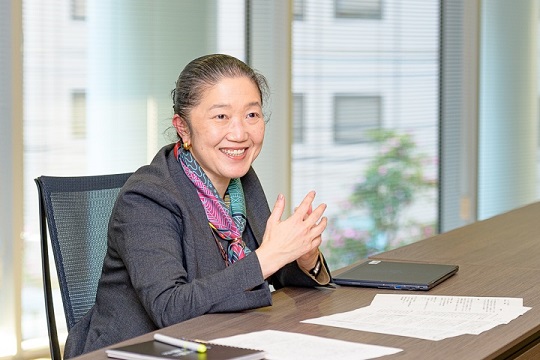
MASUDA Junko, director general, JICA Africa Department
The Eighth Tokyo International Conference on African Development (TICAD8) will be hosted by Tunisia in 2022. This will be the first TICAD to take place since the world experienced the COVID-19 pandemic. TICAD is held every three years, and the previous one was TICAD7, held in Yokohama in 2019.
“I reaffirmed the importance of building together a resilient society that can withstand any crisis by supporting Africa’s own ability to solve its problems.”
MASUDA Junko, director general of JICA Africa Department, spoke passionately about how to confront issues related to Africa in the future. We asked Ms. Masuda about her aspiration for Africa, as she envisioned her desire to work with the continent from a childhood experience, and she has indeed followed her dreams.
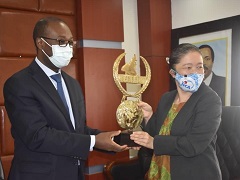
When Ms. Masuda departed from her chief representative for Cameroon, the minister of Small and Medium-sized Enterprises, Social Economy and Handicrafts of Cameroon, expressed his gratitude to JICA for its continued cooperation during the COVID-19 pandemic
“I was in Cameroon when the COVID-19 began to spread in 2020. Most Japanese staff temporarily returned to Japan at the early stages of the outbreak, but I stayed in Cameroon as the chief representative because it was JICA’s policy not to suspend its projects in the field. I thought it important, especially when there is a growing anxiety over COVID-19, to demonstrate JICA’s determination to stay engaged in Cameroon and continue our cooperation programs. I believe this action was effective to reassure the government officials and other people.”
While managing the office with only limited staff, she came across some new insights. For example, in the field of technical cooperation for rice cultivation, the staff of the Ministry of Agriculture, with which JICA was partnering, received remote support from experts in Japan. At the same time, they were taking a more independent approach to their work, proactively providing guidance to agricultural extension workers and farmers by drawing on the knowledge and experience they had gained through cooperation over the years.
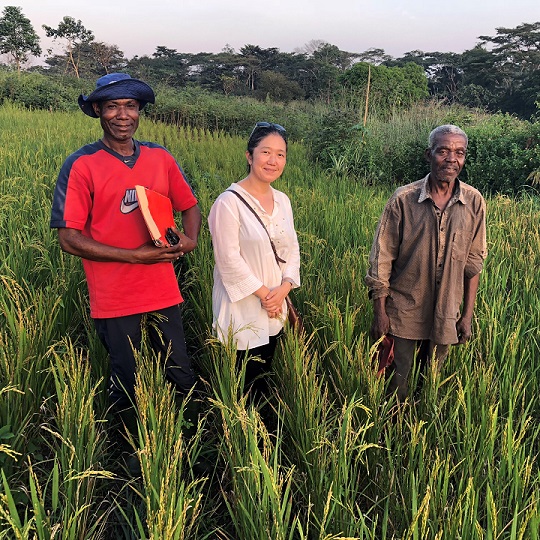
Prior to the outbreak of COVID-19, she was traveling to technical cooperation sites for rice cultivation in rural areas
By utilizing digital tools as an alternative to visiting the local sites, the scope of cooperation was broadened. For the project promoting a KAIZEN approach to small and medium-sized enterprises, Japanese consultants delivered the training content via video. Remote training allowed government executives, who previously had not had the opportunity to sit in on the on-site training, to participate through web conferencing and see the outcome in person.
“We can provide remote training to people in areas where Japanese nationals have not been able to access due to security concerns. We can also allow a diverse range of instructors from Japan to participate in the training. It used to be our common perception that training should be conducted on-site, but this has been overturned. Although there is still the issue of securing a stable communication network, a new form of cooperation that transcends distance has been instantly created.”
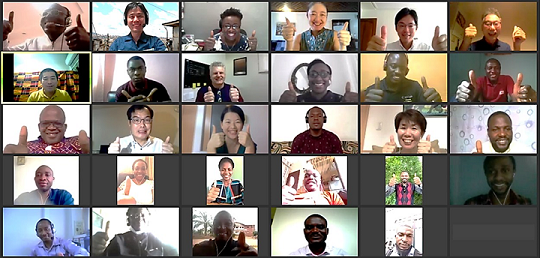
A training course on KAIZEN approach was conducted during the COVID-19 pandemic linking Japan and four Cameroon provinces. Ms. Masuda is on the top row, third from the right
Ms. Masuda has been posted to Africa for more than ten years, including Morocco, Senegal, and Cameroon, but her ties to Africa go back about 40 years. When she was in the third grade of elementary school, her father, who worked for a railroad company, was dispatched to Zaire (now the Democratic Republic of Congo) as a JICA expert, and she lived there with her family for one year.
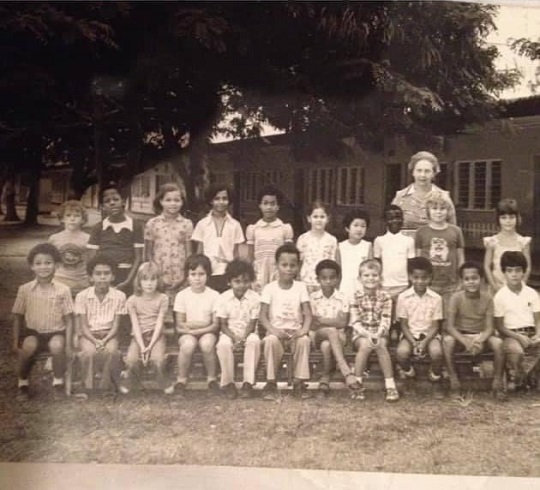
A memorable photo from her time at an international school in then Zaire (Ms. Masuda is in the top row, fourth from the right)
“Before going to Zaire, I had assumed that African people needed help to survive, and that we would be welcomed because we were there to help them. When I first started living in Africa, though, I was made fun of for being an Asian, and I sometimes felt unpleasant. However, as I began to interact with the local people daily and we got to know each other, we began to develop a sense of trust, and our relationship began to change. The people I met there were actually cheerful and powerful, and I realized that I myself had been looking at the people of Africa in a stereotypical way.”
This experience sparked her desire to play a role as a bridge between Japan and Africa, especially French-speaking Africa, which is often thought to be distant from Japan. She was determined to be personally involved in African community, directly interacting with the people and working to build a better society for them. Later, she majored in French at university and joined JICA to pursue a career in international cooperation. Up until now, she has mainly been involved in projects related to Africa.
“During the worldwide COVID-19 crisis, I keenly realized the importance of the concept of ‘Human Security’ in building a resilient society and empowering people’s capabilities. I also felt the fact that the people-focused cooperation that JICA has built up based on this concept has borne fruit during the crisis.”
Over many years, JICA has cooperated with human resource development at a medical research institute in Kenya and the Noguchi Memorial Institute for Medical Research in Ghana. These institutions played a major role during the COVID-19 pandemic by becoming a hub in Kenya, Ghana, and neighboring countries, for measures against infectious diseases. In addition, when she visited the Democratic Republic of Congo (Zaire, at that time) where she used to live, she witnessed how the local people were still maintaining the modern bridges built with Japanese assistance. It was her father and others who had provided them technical guidance nearly 40 years ago, and despite going through years of civil war, Japan's cooperation at that time is still alive and well.
As a result of the lockdown and other limitations on the flow of people and goods, there is now a growing momentum in Africa to solve social issues on its own, using digital technology and other means, rather than relying on developed countries. African people are also promoting initiatives to strengthen connectivity in both hard and soft components, and aim for Africa's economic integration as a continent, rather than as individual countries.
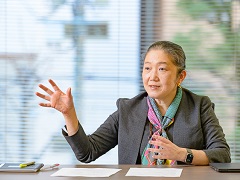
Under these circumstances, JICA is supporting startup companies working on measures to combat COVID-19 in Africa and collaborating with the African Union Development Agency - New Partnership for Africa's Development (AUDA-NEPAD) to strengthen cooperation to promote regional integration within the continent. JICA stands alongside the people of Africa who are tackling new needs and supporting them to realize their full potential.
“I respect the ownership of Africa, and would like to continue to firmly demonstrate that Japan is a reliable partner for them. I hope to connect with people who have not been involved in international cooperation in the past, and expand our relationship with Africa in new and more flexible ways. Recently, we have been working on an initiative to utilize the manufacturing capabilities of Japanese technical college (KOSEN) students to resolve issues in Africa, while also contributing to the revitalization of local communities in Japan. We will continue to take on the challenge of innovative cooperation between Africa and Japan.”
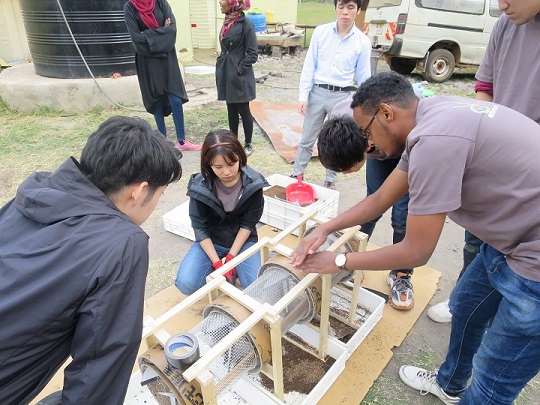
KOSEN students and a Kenyan startup company partnered to create a livestock feed sorting device prototype. A demonstration experiment was also conducted in Kenya. (photographed in 2019)
The COVID-19 pandemic has provided an opportunity for Africa, Japan, and the world to work together to explore solutions to the same challenges. Perhaps, in the future, it may be possible to get ideas for solutions from Africa. “I really want to be in the field in Africa as much as possible,” she says with a gentle and bashful smile, as she looks to the future of Africa with passionate hope.
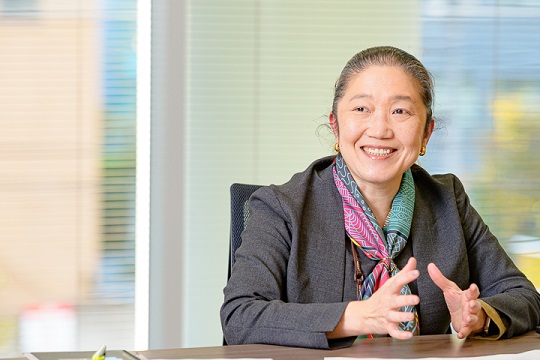
Profile
MASUDA Junko, director general, JICA Africa Department
Ms. Masuda joined the Japan International Cooperation Agency (former JICA) in 1994. After working in Morocco and Senegal, she was posted to Cameroon as chief representative from 2017 to 2020. She is from Tokyo, Japan.
scroll